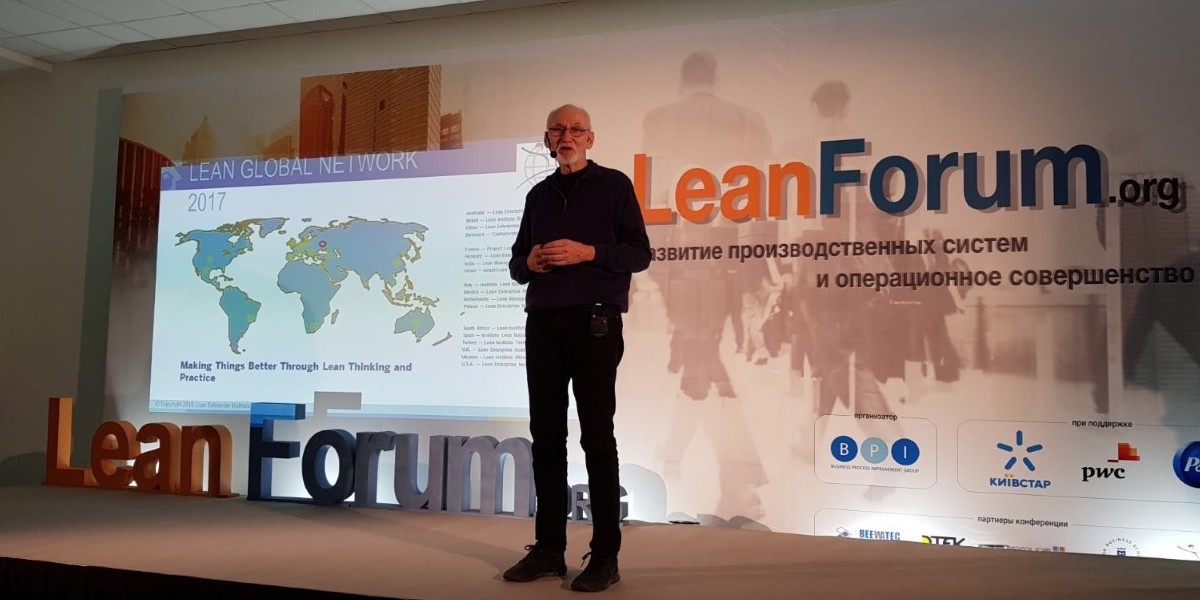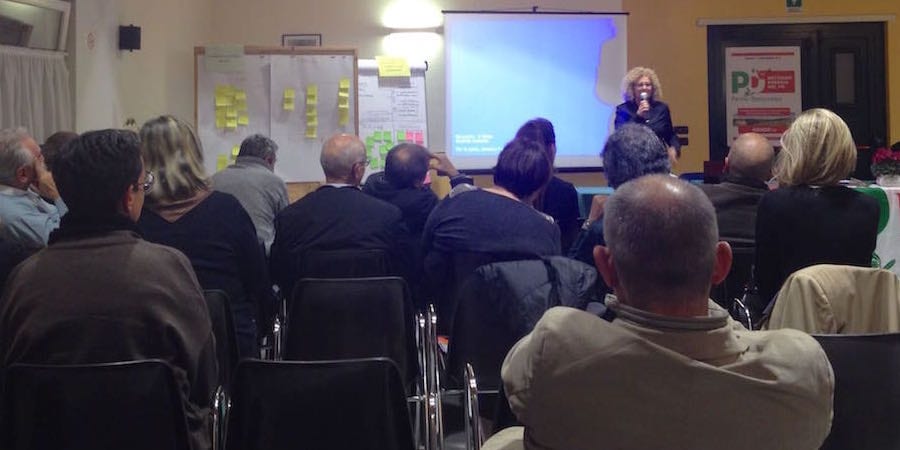
My gemba visits in Ukraine
FEATURE – As the senseless war in Ukraine continues, the author looks back to his visit to the country in 2017, recalling and celebrating its vibrant lean community.
Words: John Shook, Senior Advisor, Lean Global Network
You know that Ukraine is under siege. You may not know that, prior to the pandemic, the country’s economy was growing steadily. You almost surely do not know that Ukraine has a thriving lean movement. Pray that I am not forced to change the verb in that sentence from “have” to “had”.
Lean thinking and practice begin with addressing questions of value-driven PURPOSE – why we are undergoing any endeavor and how it meets the needs of our customers and communities. Then we ask how we can execute said endeavor most effectively. In other words, lean is not agnostic; it has a point of view, informed by fundamental thinking, values, and ethics stemming from respect for humanity and improving human conditions. Engineering tools of operational improvement can be applied to any activity – even war. Lean Thinking, by definition, is aimed at the betterment of people’s lives – at work but also outside. It aims to support peace through human development and prosperity. Lean is about eliminating waste, and war is the greatest waste of all. Lean is, therefore, anti-war by nature.
I had the honor of visiting Ukraine to observe lean activities firsthand during an intensive week in December 2017, organized by the Lean Institute Ukraine (LIU). The leader of the LIU is not a shop floor production practitioner. Serhii Komberianov is – drum roll please – an attorney. Applying lean and agile principles and practices within the legal profession is not unheard of, but neither is it mainstream. Working with Serhii, I learned that there is a “significant minority” of attorneys who have excellent potential for Lean Thinking. Lawyers are, after all, trained in what you could call “process thinking”. Add a little humanistic thinking and value orientation and, voila, you have the potential for excellent lean.
Lean Institute Ukraine states (as do other affiliate members of the Lean Global Network) its purpose as mission-driven, with the aim to help others:
- Provide more fulfilling work and continued personal development;
- Enable individuals to realize and create more value;
- Minimize resource use and environmental impact;
- Improve organizational performance;
- Raise living standards for society.
These are lofty goals, a stretch to achieve – but any progress is good progress, and progress has been made in Ukraine. LIU supports Ukrainian businesses, develops people through training and education to grow lean knowledge and expertise in the country, and strives to popularize lean thinking and practice more broadly by publishing books and conducting conferences and management roundtables.
Serhii and his team approach Lean Thinking from a holistic perspective, seeking improvements for all stakeholders. Actually, in business, we are all stakeholders. Mutual ones: what is bad for one of us will ultimately be bad for all of us.
In business, in this world, we are all mutual stakeholders. When Ukraine is under attack, we are all under attack. Is that not obvious? I offer no prescription. I wish the madness to stop.
I also have dear friends and colleagues in Russia and the Lean Global Network has an outstanding affiliate in Russia, who along with the tens of thousands of protesters across the country are as appalled as the rest of the us at what is happening.
Make no mistakes, there will be no winners in this. A stance against Putin’s war on Ukraine is a stance for the people of both countries – Ukraine and Russia. The sooner a ceasefire is reached, the better for both Ukrainians and Russians.
Russians stand to lose a lot in this, too. Until peace, RAV4s and Camrys won’t be rolling off Toyota’s Saint Petersburg assembly line, as the company proclaims: “Toyota is watching the ongoing developments in Ukraine with great concern for the safety of people of Ukraine and hopes for a safe return to peace as soon as possible”. Ford has likewise suspended production of its vans.
Serhii is calling on the lean community to support the global boycott. We must each make our own decision. I choose to support his call. I do so on behalf of the people of both Ukraine and Russia. But it is Ukrainians who are dying. It is Ukrainians who are losing their country.
For now, let me go back to my visit to Ukraine in 2017 and share with you some of the things I have seen and learned there.
LVIV
As Putin’s forces approach Kyiv and take control of more and more territory in the east, north, and south of Ukraine, the city of Lviv in the west takes on a special role, as gateway for goods coming in and for refugees fleeing to Poland and beyond. My Dec 2017 visit to Ukraine began in Lviv.
A short drive from Lviv took us to the company Modern Expo (I am with the team in the main picture in this article). Modern Expo produces display facilities for retail operations, parcel lockers systems, always with an eye to creating rational end-to-end logistics operations for complete ecosystems, from customer and community to upstream suppliers. (You can read about Modern Expo’s lean improvement activities in this post). Substantial lean improvement was already evident. As Mr. Bohdan Mazurkevych shared during our visit:

Most impressive – and a common story of lean transformation – before becoming exposed to lean, Modern-Expo began construction of a large warehouse to provide more timely shipments and better service for their customers. After exposure, however, the team quickly realized that by shortening their production lead-time they would no longer need the massive new investment. To commemorate their learning, they left the foundation and pillars standing in testament to the teachings of Taiichi Ohno!

In front of the “Temple of Ohno” from right to left: Igor Mordas, Serhii K, Bohdan Mazurkevych, Petro Pylypiuk, the author.
Since then, Modern Expo has continued its progress, always with an admirable focus beyond its own operations to the total retail system. Following my visit, CEO Petro Pylypyuk wrote to me to tell me about his intent to pursue nothing less than radical improvement of the entire retail sector, as Modern-Expo endeavors to encourage “Ukrainian business development in correspondence with actual demand from the international economy” and to “cooperate with Lean Global Network to progress Lean Production in the retail and logistics sphere, retail development in general”. Mr Pylypyuk wants to help his customers help their customers and communities.
KYIV
The first Lean Forum Ukraine attracted representatives from about 20 companies interested in hearing what lean might mean to them. Subsequent events quickly grew to steadily attract over 400 representatives from almost 100 companies.


At Unit City, with which LIU has a close relationship, we reviewed a remarkable multipurpose ecosystem designed to promote innovation by mixing education with entrepreneurialism with established businesses in a single community.

Lean Institute Ukraine board member Peter Willats with model of Unit City.
The cities of Kyiv and Lviv, which are facing possible annihilation before the eyes of the world, are among the most wonderful I have ever visited. I was taken aback by the vibrancy, openness, and optimism of their people and by the very cities themselves. The images of destruction we now see on television and the internet could not be more shocking, nor more saddening.

NY Times photo by Lynsey Addario
LEADERSHIP, UKRAINIAN STYLE, FROM THE GEMBA
The world has witnessed an outstanding example of leadership in Ukrainian President Volodymyr Zelenskyy leading from the front. His response to American offers of refuge – “I need ammunition, not a ride” – will be remembered as one of the most inspirational quotes in leadership in history.
Petro Pylypyuk of Modern Expo agrees that great leaders roll up their sleeves and dive into the deep weeds of the business: “It is my responsibility to help people see why lean has the potential to change their lives. It’s been a journey for me, too, of course. I read Toyota Production System: Beyond Large-Scale Production by Taiichi Ohno. I finally realized we had a huge problem that we weren’t seeing: becoming more efficient and transforming ourselves was a necessity in the current market conditions (many Ukrainian companies still haven’t realized this need for change). I saw something in lean that could really help and started to spend every waking hour at the company, trying to adapt the TPS ideas to our circumstances. I knew I had to understand lean myself before others could. They say lean is like a religion. If that’s true, then the CEO is like a prophet: an early believer who spreads the good word.”
Ukraine seems chock full of great leaders like Petro, or Serhii, or President Zelenskyy, though old-style bureaucratic policies may continue to stymie them too much of the time. I pray they will be able to continue bringing prosperity to their companies and their country.
Until then, I accept Serhii’s plea to join the global boycott of Russian goods and services and call upon each member of the global lean community to do the same.

Note from the Editor - The Lean Global Network is proud to have the Lean Institute Ukraine as a member. Sadly, the war has made it impossible for LIU to continue its work educating and supporting Ukrainian organizations at the present time. LGN has established a GoFundMe to collect donations to help the LIU team members meet their basic needs, such as food and shelter, and to continue their important work as soon as the conditions allow. Our goal is to collect $280,000, which equals the annual payroll of LIU. We invite you to contribute here.
THE AUTHOR

Read more


FEATURE – A local branch of Italy’s Democratic Party has started using lean principles and tools to organize its activities more effectively and to counteract the discouragement that followed a bad electoral defeat.


FEATURE - What if it were your staff driving change rather than managers? A focus on improvement at the front line and on people development proved critical to the lean transformation of a Stanford hospital.


FEATURE - Develop your people if you want to develop a better (lean management) system in your business. This is the key message of this article, which looks at the role of management in an organization and in society.

